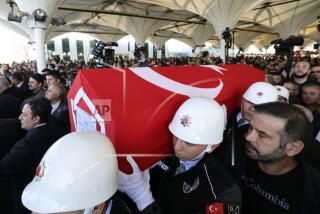To Hit U.S. Bases, Firms, Philippine Rebels Say
- Share via
MANILA — Communist guerrilla leaders plan to attack U.S. military installations and American businesses in the Philippines, the Communist Party warned in a statement issued Friday.
The decision reflects a radical change in policy. In the 18 years since the Communist insurgency began, the guerrillas have confined their targets to the Philippine military, the police and right-wing business establishments, apparently to avoid alienating potential foreign support.
The party statement, issued by the Central Committee, said the guerrillas will expand their strategy of “revolutionary sabotage” to include airports, power plants and communication and transportation facilities, and added that “U.S. imperialism’s military installations and business empires are not spared.”
U.S. Ambassador Nicholas Platt, commenting on the statement, told a press conference that an extensive security review is being undertaken at the U.S. Embassy in Manila and at two big U.S. military bases north of Manila, Clark Air Base and the Subic Bay Naval Base.
Escalation of Conflict
“I take all threats to the security of Americans very seriously,” Platt said.
He said that some additional security measures had been taken, but added that he would not be specific “for obvious reasons.”
The party statement, set out in the current issue of the party publication Ang Bayan (Our Country), concedes that the use of sabotage is an escalation in the armed conflict.
“The idea,” it said, “is to widen the arena of war while creatively and boldly developing new forms of struggle. Sabotage exacts from the enemy the highest price for its unjust war.”
Guerrillas have already blown up several bridges in the Bicol region southeast of Manila, and destroyed two power stations in the province of Ilocos Norte. President Corazon Aquino and the armed forces chief, Gen. Fidel V. Ramos, have described the attacks as “desperate acts” that are turning the people against the guerrillas.
Acknowledging a loss of support, the party statement said: “To our friends and the people, we must painstakingly explain the rationale behind sabotage. There may be indirect, unpleasant effects on the people, . . . but the people know only too well that the havoc and destruction wrought on their lives and properties by their oppressors are a thousand and one times worse than what they have to sacrifice to attain their national and democratic aspirations.”
It went on to say that “the whole economic system is a target of sabotage,” and that the aim is “to shatter the foundation of the war economy while preventing the government from making progress in the modernization of capitalism as a way to reactivate the economy.”
‘U.S. Is the Brains’
In an attempt to justify the inclusion of American targets, the statement said: “U.S. imperialism is the brains behind the intensified war against the people and the revolutionary forces. It is the source of millions of dollars worth of weapons of death and destruction.”
The U.S. government has committed itself to supplying the Philippines with $900 million in military and economic aid under an eight-year agreement that permits the United States to maintain its bases here until 1991.
Ambassador Platt, at his press conference, restated Washington’s commitment to the Aquino government. In a speech two weeks ago, he announced that a shipment of military equipment, including trucks and armored personnel carriers, was en route to the Philippines.
Meanwhile, a nationwide general strike failed Friday to paralyze key industries. Some economic analysts had feared that it would further destabilize President Aquino’s 19-month-old government, but transport workers refused to join the largely peaceful strike and most industries were operating normally.
More to Read
Sign up for Essential California
The most important California stories and recommendations in your inbox every morning.
You may occasionally receive promotional content from the Los Angeles Times.











